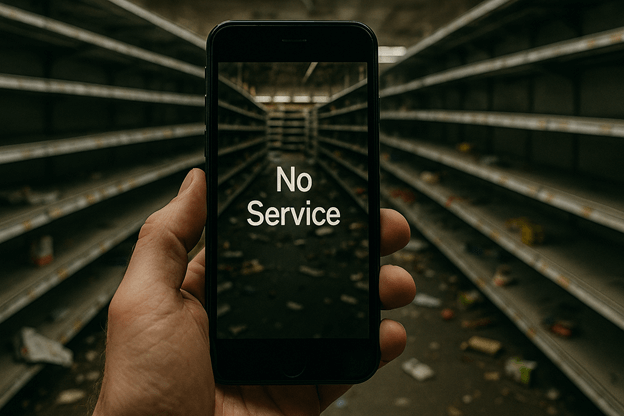
Cyberwars & Empty Shelves
Posted June 24, 2025
Chris Campbell
Yesterday, I woke up to a digital dead zone.
No internet. No phone. No texts. No calls. Just me, a black mirror, and the creeping thought: “Should I have bought those 39 acres with apple trees and a musty bunker?”
With the Iran–Israel situation escalating, and cyberattacks flying back and forth like digital missiles…
I did what any rational person would do—I threw on pants and started walking.
After scouting a few blocks in each direction, I found a weak WiFi signal leaking out of a nearby basement bar. (Turns out, they used a smaller, local ISP.)
Bingo. I was back online.
BUT… the world I returned to was flickering.
I still couldn’t call. I couldn’t text anyone locally, either. I was only receiving texts from outside of my local area. (Still don’t know why.)
And I got the first small taste of what it might be like to be digitally stranded.
The “Big One” is Coming
Let’s start with a worst-case scenario.
In 2017, a piece of malware called NotPetya exploded across Ukraine. It looked like ransomware—“Pay $300 in Bitcoin”—but the files were never coming back.
It was a wiper, designed to destroy.
Hospitals. Banks. Power grids. ATMs. Shipping companies. Everything offline.
It spread globally—hitting Merck, FedEx, Maersk (13% of the world’s shipping). Total damages? $10 billion. All from one hacked Ukrainian tax software update.
The message was clear: You don’t need bombs to bring a country to its knees. Just code. In fact, cyberattacks are now being used to soften a country before kinetic war.
In 2008, before Russia invaded Georgia, they hit them with a cyberattack on news agencies, banks, and government sites.
In 2020, Azerbaijan and Armenia went to war over a disputed region called Nagorno-Karabakh. Beforehand, Armenia’s government websites were taken offline. Propaganda videos appeared on official pages. There were several attempts to disrupt military drones and radar.
And prior to the missiles, the Iran–Israel cyber war got real…
In 2023, Israeli-linked hackers shut down 4,300 Iranian gas stations. Iranian groups hit back by breaching Israeli hospital data. Then pro-Israel hackers drained millions from Iran’s crypto exchange–a $90 million heist.
Iran’s response? Shut off the entire internet to stop the bleeding.
It’s not just the Middle East. Global infrastructure is the collateral damage.
- UNFI Hack: Disrupted Whole Foods. Pharmacies delayed meds. Shelves went bare. Small stores scrambled for butter substitutes.
- Supply Chain Attacks: Up 400% in recent years. Hackers go upstream—hit the distributor, and you hit 30,000 stores downstream.
- Everyday Ransomware: Cities, schools, and hospitals are being locked out of their systems.
Every single day, innocent people are getting tricked, hacked, and robbed.
No matter who you are, you’re far from immune.
What These Attacks Look Like
There are several ways you could get hacked. And the threats compound by the day.
Here’s a quick rundown:
- Phishing: Fake emails from your “bank.” Click the link, give your password—game over.
- Ransomware: Malware that locks your files and demands crypto. Pay up, or it’s gone.
- DDoS: Overwhelm a website with traffic until it crashes. Like 10,000 bots blocking the door. Often used by nations.
- Man-in-the-Middle: Hackers intercept your messages on public WiFi and read or change them.
- Social Engineering: Hackers pose as IT or drop infected USB drives labeled “Payroll.”
You don’t need to be “important” to be a target.
You just need to be online.
What You Can Do (Without Buying a Bunker)
You don’t have to be tech-savvy.
You just need to stop being low-hanging fruit.
Here’s how:
- Use a YubiKey (physical passkey device) or Authenticator app – Ditch text message 2FA. SIM swaps are real. Hackers often have people on the inside at telecom companies.
- Use a password manager (with Yubikey) – One unique password per account. Stop using your dog’s name.
- Update your devices – Those annoying updates patch real security holes. Use them.
- Back up your files – If ransomware hits, you don’t want your important documents held hostage.
- Avoid public WiFi for sensitive stuff – Or use a VPN.
- Think before you click – Emails that feel “urgent” are often fake. Go to the websites manually for confirmation.
- Consider Starlink in case the internet goes down – I think it’s time for me to make the leap.
Don’t Panic. Prepare. (Then Invest.)
I spent an hour in that basement bar reading about cyberattacks—and watching real-world systems fall apart like dominos.
The internet going down used to be an inconvenience. Now, it’s a warning.
Cyberwar isn’t coming. It’s here.
And the next time your internet goes out, it might not just be your router.
Don’t panic. Prepare.
And maybe keep a backup plan in your back pocket. Like a local basement bar with good bourbon—and working WiFi.
As usual, we’re on the lookout for more opportunities in cybersecurity. Stay tuned.
More to come.
